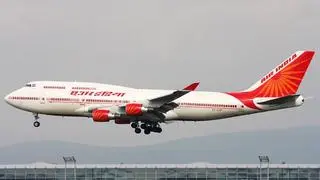India’s attempt to make a commercial aircraft for the global market might not have met with much success so far but this does not mean that the journey is over. On the contrary, the picture that is emerging is very promising.
The work done by Indian companies, someexclusively by them, is a big factor in making both Boeing and Airbus aircraft fly. While the full aircraft may not be manufactured in India, both Boeing and Airbus aircraft have critical parts being manufactured here.
Take for instance Dynamatic Technologies, which is the sole supplier for flat track beams for Airbus A-320 and A-330 aircraft. These beams are manufactured in India and dispatched to Europe where they are fitted into the assembly lines and then delivered to customers.
Talking to BusinessLine , Srinivasan Dwarakanath, Managing Director, Airbus India, pointed out that this was a big deal as Dynamatic is a single source supplier. “When you qualify someone as a single source it is not enough that they have the necessary skills, (it is) important (to ensure) that the logistics are taken care of, important that the material is supplied to them every step of the way and they need to be taken care of so that they actually deliver. This is important because we commit to the customer and the customer sells tickets to you and me. So if they cannot deliver you can see the impact,” Dwarakanath said.
He added that all Airbus aircraft coming out of its assembly line were partly made in India or had something made in India.
“If you look at the Airbus 320, 330 or the long-range aircraft that we make like 350 or 380, there are either assemblies or different parts which are made in India,” he said. Engineering, manufacturing and customer support are the three broad areas, apart from R&D, where Airbus focuses its energies in India.
Airbus’ rival Boeing too is not far behind. In fact, its aircraft have a ‘Made in India’ tag.
Pratyush Kumar, President, Boeing India, told BusinessLine that if one is to take the number of products from India in an entire aircraft it will probably be small but the jobs done by Indian companies are very important.
Software coding too“In some areas they (Indian companies) have done pretty well. For example, like software in avionics (a lot of the) embedded stuff is coming from India. Three million lines of code for the Boeing 787 were written in India. So the software for the flight control system was written in India. This is basically the system that controls the flight of an aircraft or the avionics,” he explained.
Pointing out that an aircraft is a highly engineered product, Kumar added that India, with its deep and broad capabilities in engineering and a very competitive wage structure, is well positioned to be a significant part of the global chain of aerospace and aviation.
One of the biggest success stories for Boeing in India has been composite beams, which are considered the spine of the aircraft on which its internal stress is carried. These are manufactured for the Boeing 787 Dreamliners by TAL Manufacturing Solutions, a Tata enterprise in Nagpur. The 5,000th floor beam of this stress bearing critical component involving very high tech and skilled manufacturing was shipped out recently.
“For the beam, India is one of the two production centres in the world. The other one is in California. At this time, we are seeing better quality from India,” Kumar said.
Both Boeing and Airbus tied up with suppliers in India decades ago. Airbus’ industrial cooperation with India began in the 1980s when an agreement was reached with Hindustan Aeronautics Limited (HAL) to manufacture forward passenger doors for the A-320 aircraft.
Boeing started procuring the forward doors for the 757 in the mid to late 1990s and in 1991, HAL became the single-source producer of Boeing 757 over-wing exit doors.
Stronger partnershipsThe partnerships have been strengthened over the years. Today Airbus has about 45 suppliers which it has developed over the last 10 years. “If you look at Asia, India is the number one country when it comes to engineering services for Airbus,” says Dwarkanath.
However, the momentum has picked up even more recently, thanks largely to the ‘Make in India’ campaign by Prime Minister Narendra Modi.
“After the launch of ‘Make in India’, Boeing has doubled its sourcing from India,” Kumar says. Its sourcing from company and Tier I (direct) suppliers has doubled in recent years and stands at about half a billion dollars, Kumar added.
Airbus’ Dwarakanath points out that in 2015 Airbus’s sourcing from India was a little over $500 million.
“We do expect future growth in our supply chain in India and we continue to look at opportunities to collaborate with Indian industry, based on companies’ competitiveness as well as the requirements for our airplane production,” Kumar said.







Comments
Comments have to be in English, and in full sentences. They cannot be abusive or personal. Please abide by our community guidelines for posting your comments.
We have migrated to a new commenting platform. If you are already a registered user of TheHindu Businessline and logged in, you may continue to engage with our articles. If you do not have an account please register and login to post comments. Users can access their older comments by logging into their accounts on Vuukle.